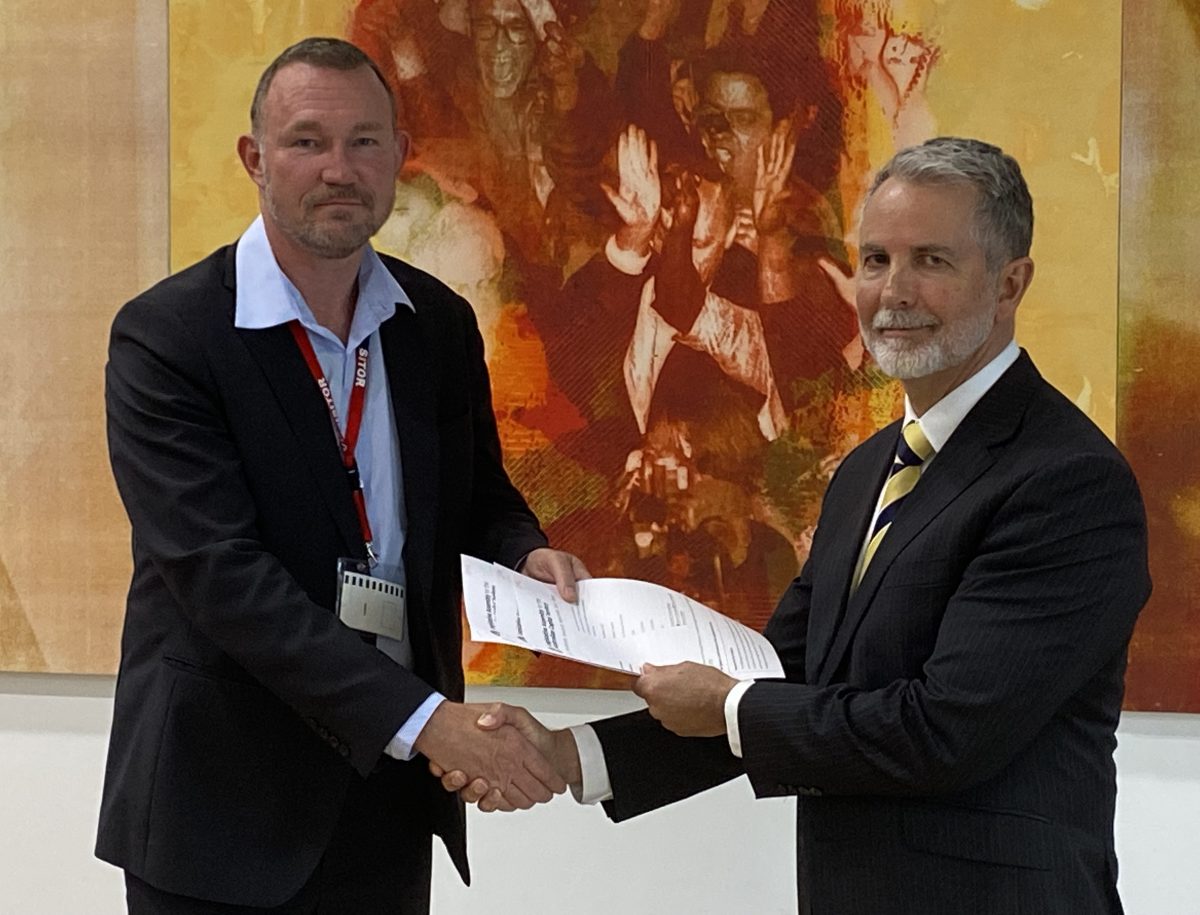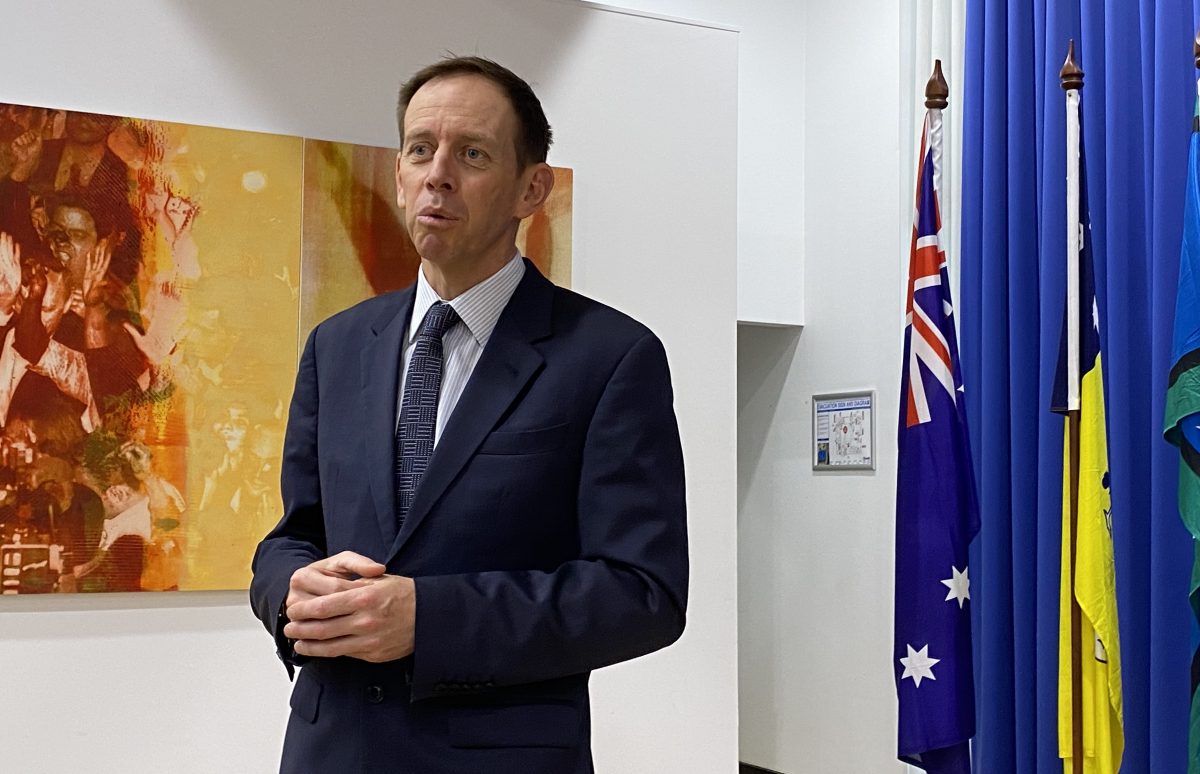
Tom McLuckie handed three petitions calling for legislative change and review to Opposition spokesperson for police Jeremy Hanson. Photo: Claire Fenwicke.
Around 7,000 people have called for safer roads in the ACT across three separate petitions organised by Tom McLuckie whose son Matthew was killed in a crash on Hindmarsh Drive earlier this year.
The petitions were presented to the Opposition today (7 October) at the same time as the ACT Government announced the formation of a new council to examine areas of potential law reform. Advocates are concerned it will be a “toothless tiger”.
The three petitions called for three separate actions: to implement sentencing guidelines for grievous and purposefully reckless motor vehicle crimes, an independent review of the ACT Judiciary regarding sentencing, and a review of how judges and magistrates were appointed to the courts.
“It’s by the Grace of God that other people haven’t been killed,” Mr McLuckie said.
“These kind of dangerous criminal behaviours are occurring daily … there are some repeat behaviours on our roads that are not being appropriately penalised.”
Mr McLuckie handed the petitions over to Opposition spokesperson for police Jeremy Hanson, who thanked him for his tireless campaigning.
“The campaign you have mounted following the tragic death of your son is an inspiration to many,” Mr Hanson said.
“The evidence you have collated and data you’ve provided are compelling. It’s demonstrated there is a problem. The system is broken.”
The petitions will be tabled in the Legislative Assembly next week.
It came on the same day Attorney-General Shane Rattenbury announced the Law and Sentencing Advisory Council, which he said would not only advise the government on how to keep the law current and relevant for the community but also have a sentencing advisory role.
“Instead of a one-off review, this council will be a lasting mechanism that will be both proactive and reactive in considering sentencing issues,” he said.
A similar council was disbanded during the last term of the Assembly, but Mr Rattenbury said it was decided it was important to bring it back.
“Every other jurisdiction has this in one form or another,” he said.
“It’s a valuable format where other segments of the community can comment on often complex matters.”
Mr Rattenbury admitted recent community interest in sentencing laws in the ACT had shaped part of his decision.
However, he still didn’t agree a wholesale review of the bail and sentencing practices in the Territory was needed.
“But areas do need to be looked at,” Mr Rattenbury said.
“The council will undertake community and stakeholder consultation and conduct and publish research to make recommendations on law reform, and sentencing issues referred to it.
“In the past months, we have seen calls from within the community for changes to sentencing. This council will operate independently to address issues as they arise in a considered and consultative fashion.”
It was expected there would be 10 to 12 members, with representatives from the community and justice sectors. This could include ACT Policing, ACT Courts, the ACT Bar Association, the ACT Law Society, community organisations and victims of crime.
“I do expect direct changes to the law will arise from this,” Mr Rattenbury said.
Similar councils across the country had been contacted to learn what had been successful and what pitfalls could exist.
Nominations were expected to open in the coming months, and a review of the council’s effectiveness was being considered after two or three years of operation.
It would be funded out of the Confiscated Assets Trust.

Attorney-General Shane Rattenbury expected laws would change as a result of the new Law and Sentencing Advisory Council. Photo: Claire Fenwicke.
Mr McLuckie said that while the council’s announcement was a positive step, it wasn’t enough.
“For families who don’t feel justice has been achieved … having a place to go is a good thing,” he said.
“But my challenge is there’s been a denial there’s a problem … you can’t fix a problem until you acknowledge you have one.
“The devil is in the detail.”
Despite his strong campaigning, Mr McLuckie said he had no plans to nominate for a position on the council.
“I want to get back to my normal life at some point … I want to get back to being Tom McLuckie, the guy who works in IT,” he said.
Meanwhile, Mr Hanson also welcomed the council as an “acknowledgement the system is broken”.
“I think it’s the first time we have that acknowledgement,” he said.
“But it’s likely to be a toothless tiger, we had one before and it didn’t get the job done.”
The ACT Bar Association has also weighed in on the debate, saying it felt a review of the bail and sentencing system was unnecessary.
A statement said a review would be an “undue waste of community resources”.
“There is a review process already in force. It is the appellate process,” it said.
It argued tougher laws wouldn’t solve the issues underlying criminal offending.
“[These] often lie in abject social disadvantage, disengagement and drug addiction,” it said.
“These issues must be addressed in conjunction with the criminal justice system in order for there to be any real progress with respect to criminal offending in the Canberra community.”
It pointed to the Drug and Alcohol Court as an example of where additional sentencing options were available.
But Mr McLuckie argued this wasn’t enough, that bail was given too easily and sentences needed to reflect the impact on victims.
“Some of these people who have been re-arrested have been getting bail again. [Police] are only one part of the system,” he said.
“[The courts] seem to be a law unto themselves … there [needs to be] a review of the system.”
Original Article published by Claire Fenwicke on Riotact.






